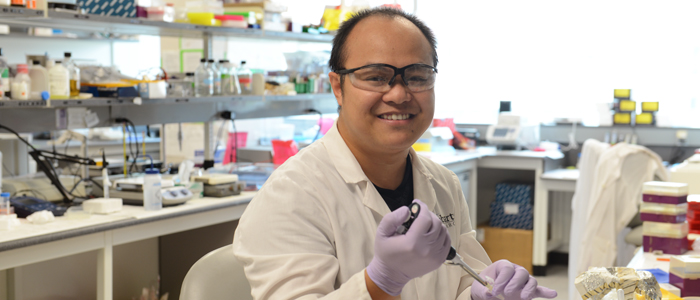A chance encounter with fate: Q&A with Hao Yin, PhD

Thousands of miles away from his home country of China, Hao Yin, PhD, didn’t know what his future would hold once he completed his PhD program at the University of Calgary. Then, by chance, he met his current supervisor Dr. Geoffrey Pickering, PhD — an encounter that led him on the next step of his journey in Canada.
Yin sat down with us to discuss his passion toward scientific research, and what he does when he isn’t working in the lab.
Where were you born and raised?
I was born and raised in the most southern province in China. I lived there until I was 18 years old, then moved to Beijing, China for university.
What is your education background?
For my undergraduate degree, I majored in biotechnology, which I found very interesting. I then moved to Calgary, Alberta to complete my master’s degree in biochemistry and molecular biophysics. After one year, I made the decision to transfer into the PhD program, which I completed in 2010.
What brought you to Schulich Medicine & Dentistry?
This all depended on a single opportunity — a moment of fate. When I completed my PhD thesis defense at the University of Calgary, one of the committee members was my current supervisor, Dr. Pickering. I could tell he was an excellent scientist just by the comments he made and the questions he asked. Following my defense, I sent an email to him and we began discussing the potential of me joining his lab at Robarts Research Institute. I started my postdoctoral fellowship in 2010.
Another reason I wanted to stay in Canada is because I got married here in 2008, and I think it is a great place to raise a family and create a more stable life.
Tell me about your research.
In Dr. Pickering’s lab we are working on a lot of things associated with cardiovascular biology and disease. Generally speaking, when your muscle gets injured — especially cardiac muscles — you need new blood vessels to feed the injury zone. When you have a damaged organ, your blood vessels are also injured, and we are looking into what we can do to make your blood vessels grow back better.
My main research project is looking at how to modulate those regenerating blood vessels so they can grow back in a more normalized condition. We need to understand how blood vessels are participating in all stages of organ injury and regeneration.
Why did you choose to do this kind of research? What made you go into this specific direction?
Many people are affected by cardiovascular disease — most people know someone who has been affected by it. In this scenario, you can only dream of some magic therapy for treating it, which is one reason why I’m interested in this research.
Another interest for me is discovering what the mechanism is to rebuild a normal organ. In war, if a building is destroyed but you still have the blueprints, you can recreate it and restore it so it is exactly the same. But for organs, if you injure it that is a permanent injury — we do not understand exactly how it has been built.
What is the potential impact of this research?
Two major populations will be affected by the potential benefit of our research. The first are the patients that have suffered from a heart attack or angina. The second are the patients with diabetes. People with diabetes can lack blood flow in their lower extremities, and that’s something we would like to rescue. Our research is helping to rebuild normal blood vessel networks, and we would want to help target blood flow into the injured muscle zone.
What is most challenging about the work that you do?
You need to understand and master new techniques on a regular basis. Every few months, there will be a new technique introduced and you need to make the decision whether or not you want to pursue this technology. If you make that decision, it’s challenging because you need to invest a lot of time and energy into really learning how to use the tools.
Scientific research heavily relies on the tools — without tools, there is no science. If you don’t adapt to the modern tools you will be left behind. That being said, you only have limited time and energy, so you need to make careful choices about which new technologies and techniques you want to invest in.
Do you have any specific career or research goals?
I would like to continue working in Dr. Pickering’s lab for another year or so, so I have the opportunity to finish my current research projects. In the long term, if I am lucky enough I would like to have a faculty position somewhere in Canada. The academic sphere is where the most enjoyable aspects of scientific research take place.
When you’re not in the lab working, what do you like doing in your spare time?
I have a three-month-old daughter, so I spend most of my time with her. I also enjoy reading manga graphic novels and watching movies when I have spare time.








